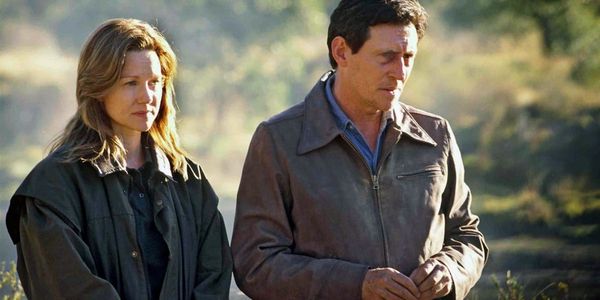Eye For Film >> Movies >> Jindabyne (2006) Film Review

In the heat of the Australian outback four white men are about to start an age old ritual - they're going fishing. After hours of driving and hiking they finally reach the tranquil valley on the other side of the mountain, deep within a nature reserve, far from the eyes of their women and uncontactable by the rest of the world.
But this year they're not alone; floating face down in the icy cold water is the body of Susan; raped, murdered and discarded into the fast flowing river. Her discovery shakes them, but still they decide to fish for a day before alerting the police. Their reasons? Perhaps it's indifference to the dead, perhaps sheer laziness, perhaps an unwillingness to break from traditions, perhaps a deep seated immorality, perhaps ingrained racism? Their decision causes anger, hatred and mistrust in the town of Jindabyne.

Jindabyne is the latest feature from Lantana director Ray Lawrence, and like his previous work it's an intelligent character driven drama that draws great performances from all involved - especially Gabriel Byrne and Laura Linney. The style is obviously visually similar to his previous work, but captures the sense of the scale and desolate beauty of the Australian outback that is reminiscent of the Africa of The Constant Gardener.
During the men's trip into the wilderness the tone is drowsy and hypnotic, much like Picnic At Hanging Rock, Walkabout, or even The Proposition; a vast emptiness and a sickly heat conjured by droning music and burnt out colours - they are stuck in fevered dream about to turn bad. On their return to the rural town, civilisation snaps back on, the pace returns to normal and the men are forced to confront the negligent stupidity of their actions and the backlash of hatred that they've caused. Their partners must choose where their allegiances lie - with their men, or their morals?
The plot of Jindabyne is interpretable on myriad levels; the racial conflict between the slighted aborigines and the white population, personal values versus tribal ties, trust between husbands and wives. The film doesn't feel convoluted, but is complicated and, possibly, leaves too many questions unanswered; while there is a sense of resolution at the climax it is ambiguous and complete closure is never achieved. This could be intentional, echoing the reality of the situation - individual victories are achieved, but the problems addressed are ultimately insoluble, part of our human nature.
Jindabyne is an extremely ambitious attempt to roll the racial, familial and generational tensions of an Australian community - or even humanity - into one story, and while it's not perfect, it does manage to hit many nails right on the head.
Reviewed on: 07 Sep 2006




















